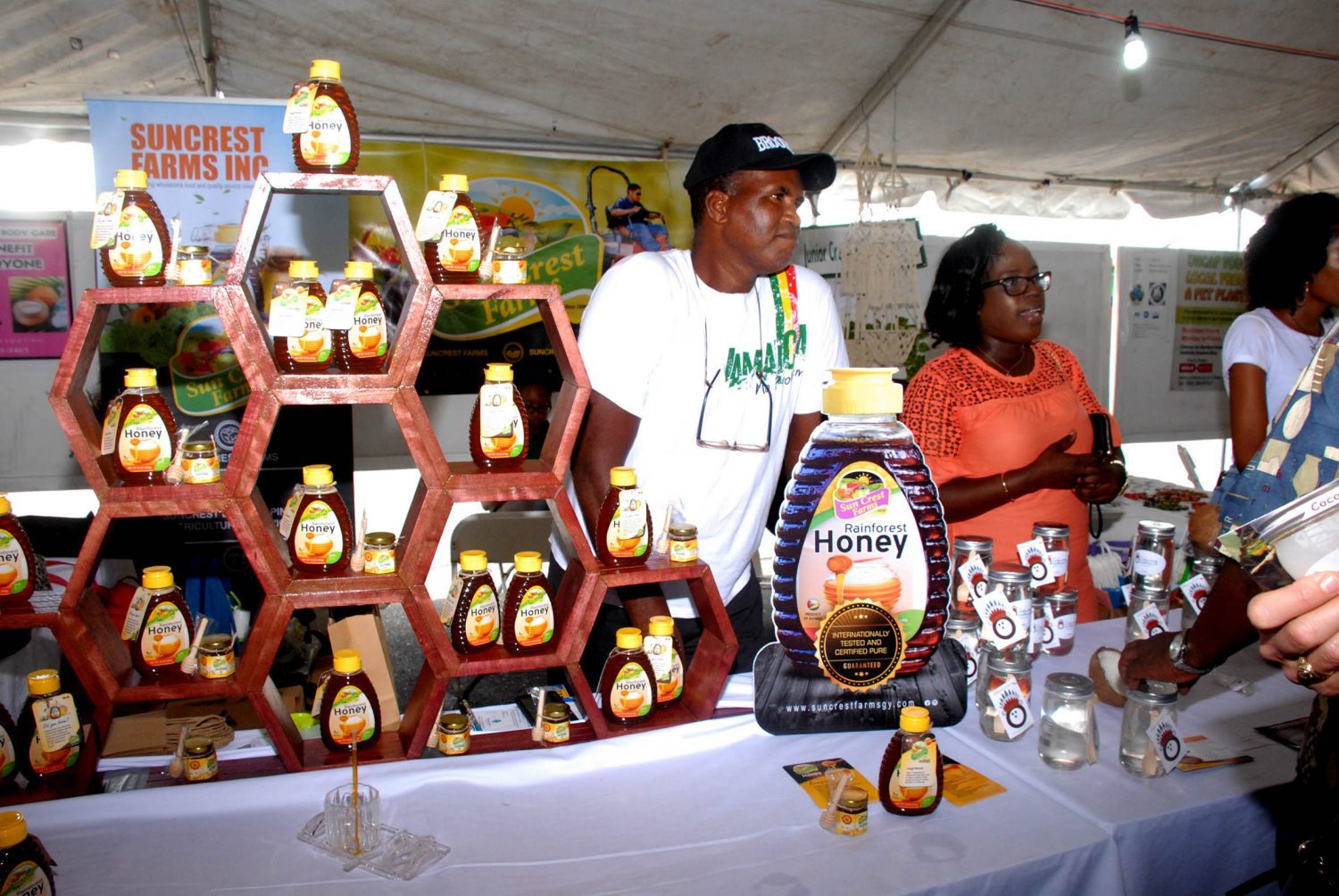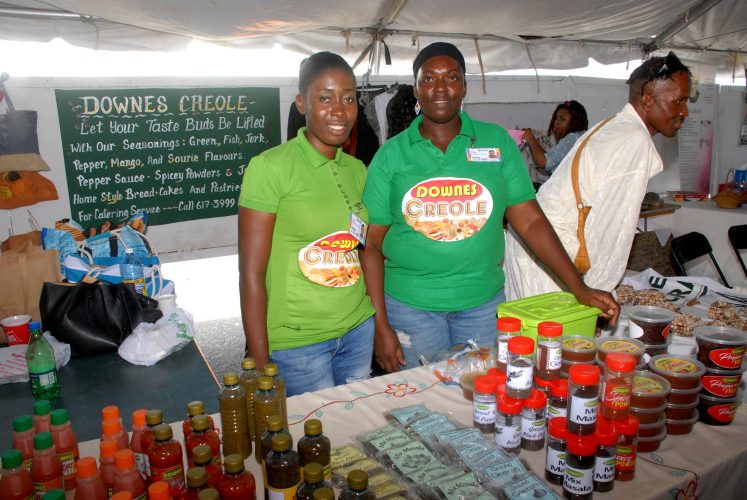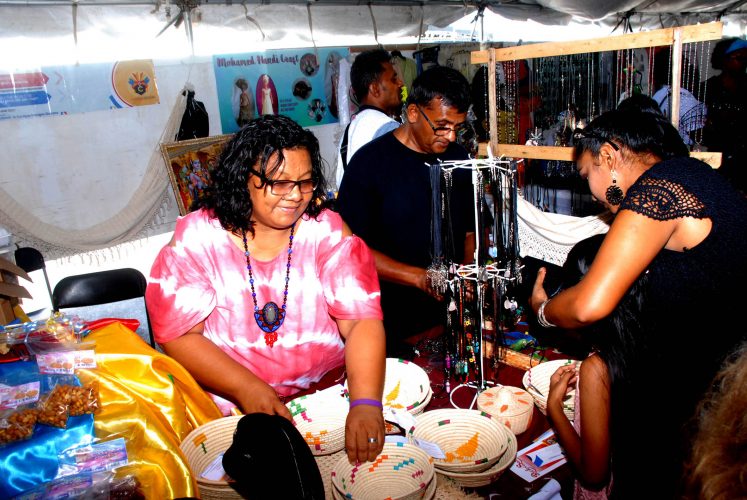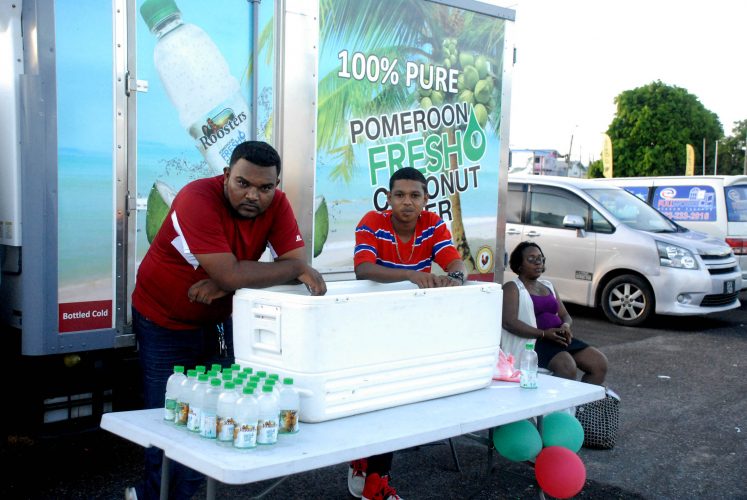Last Sunday’s UncappeD Marketplace event marked another potentially key phase in the protracted search for a place of prominence in the country’s economic ‘sun’ for the agro processing sector. If that place remains difficult to find, the current acceleration of the search by the Guyana Manufacturing and Services Association (GMSA) in collaboration with the Ministry of Business would appear to be heading in the right direction.
It’s easier to demand more in a hurry. The reality is, however, that over the years, both the public and private sectors, the former by simply failing to invest sufficient resources into the sector and both by failing to work together, have left local agro-processing struggling. That does not mean that the current effort to salvage and grow the sector should not be recognized.
How to boost production of raw materials necessary for the growth of a thriving agro processing sector, apply the science necessary to ensure high-quality products, fund the machinery to ensure more efficient production, significantly upgrade packaging and labeling, increase local and export demand in the face of formidable external competition, improve food safety standards and – perhaps above everything else – arrive at a point of affordable electricity are all challenges which the sector faces…simultaneously.
Last Sunday’s event could hardly have been expected to provide answers to this mountain of questions though what it did was to provide persuasive evidence that the agro-processing community, comprising, in the main, small, underfunded, under-resourced operators are not buckling under the pressure. If the observation might appear to be more than a little cliched, it is almost the best that can be said for a sector that has, over the years, suffered from a pointed lack of any really strong institutional support and which, into the bargain, has been a victim of the indifference of a commercial banking sector more concerned with placing its financial backing behind what it considers to be ‘surer things.’
Providence, and the first UncappeD event at Sophia late last year, suggests that the worm may be turning. What UncappeD Marketplace symbolizes is a new-found collaboration between the public and the private sectors that has not traditionally been in evidence. That apart, the presence of a leading local commercial bank (Republic Bank) at Providence on Sunday points to a shift – albeit a still limited one – of banking interest in the direction of the potential which the agro-processing industry offers.
The signs of forward movement in both public/private sector cooperation to support the agro-processing sector are unmistakable. On hand as well at Providence on Sunday were the Small Business Bureau, offering grants as well as collateral support for the agro-processing sector and the Guyana Shop and the Ministry of Agriculture’s modest outlet for agro-processed foods which, though providing a more than worthwhile service now needs to be modernized and expanded if it is to more effectively spread the ‘consume local’ message more effectively. That is, in large measure, the government’s responsibility and given evidence of what is now a more assertive, more confident agro-processing sector, it really isn’t too much to ask.
One regret about Providence on Sunday, it has to be said, is that it manifested, once again, the continued failure to ensure really meaningful hinterland representation beyond the now accustomed tokenistic undertakings. Here, corrective measures can only be realized through greater effort on the parts of state agencies like the Ministries of Amerindian Affairs and Social Protection with the support of Amerindian officials and agro-processors in the various communities to ensure that at the national level, the economic opportunity which agro – processing can afford Amerindian communities, where there are few other serious employment options is not permanently overlooked.
For all its limitations, Sunday’s UncappeD Marketplace event made a more than encouraging even if not overwhelming statement, drawing a crowd of perhaps a few thousands over the course of the day and in effect realizing a producer-consumer interaction which, based on the feedback gleaned by this newspaper, may well have been transformed into longer-term business relationships in quite a few instances. Vendors were appreciative of what, at these events, is usually a higher than normal level of patronage even though they conceded that breakthrough business deals remain difficult to come by. Those will have to materialize out of hoped-for growth in regional and international markets.
This newspaper’s reporter arrived at Providence at around 14:00 hours when it seemed that visitors to the event had reached a peak. The tents erected to accommodate the sixty-odd vending stalls were stuffed with vendors and their goods and visitors, the now familiar blare of popular music at these kinds events presenting less of a compelling (and unwelcome) distraction than has customarily been the case.
Fruit is the backbone of Guyana’s agro-processing sector and our conversations with some of the smaller vendors comprised mostly of stories of the inventiveness involved in fighting through limitations arising out of a lack of appropriate equipment and space to produce products which they insist can match the more expensive, more favoured imports. It is the labeling and packaging and the failure in many instances to measure up to the food safety standards of the Government Analyst Food and Drugs Department (GAFDD) that have traditionally been holding them back.
At Providence on Sunday, it seemed that an increasing number of manufacturers, their processing still confined to domestic kitchens, have grasped the importance – even in their limited circumstances – of meeting the GAFDD’s food safety standards requirements.
What can be asserted with a far greater sense of confidence is that the agro-processing sector has gone forward by leaps and bounds insofar as packaging and labeling are concerned. Pickles and jams and jellies presented in second-hand jam jars with hand-written or typed labels on sheets of paper and plastic bags containing products and stapled at the opening to keep the flavour in are things of the past. In their place. even the smallest operators at Providence on Sunday turned in high quality labeling and packaging so that on the surface at least it seemed as though they were ready to challenge the more exalted imports which our commercial outlets still favour on account of what is only a gradually shifting consumer demand.
The evidence on Sunday suggests that the banking sector’s support is altogether merited, local agro processors, having demonstrated, through their enhanced packaging and labeling standards and enhanced understanding of food safety practices, that they are ready to begin the march from cottage industry to substantive business enterprise.
President of the Guyana Manufacturing & Services Association (GMSA) Shyam Nokta and the Association’s former President Ramsay Ally, regarded as the UncappeD ‘front man,’ are the principal private sector promoters of what now appears to be a genuine desire to take the agro processing forward. Significantly, in circumstances where the public and private sectors have not always worked well together, Nokta has persistently sought to provide assurances that the GMSA is entirely persuaded of the support of the Minister of Business for the initiative. Still, he is mindful to point out that whilst the process of raising both the profile and the performance of local agro processing is a process rather than any single event, there is an urgency associated with the pursuit that is linked to the role which agro processing can play in creating jobs and lifting ambitious and energetic working class individuals and families out of poverty.
Ally believes that in large measure, the immediate-term future of the sector may well repose in the outcomes of the so-called “high level’ caucus ensuing with a team of government officials including Gaskin and Finance Minister Winston Jordan and which, having completed discourses on the way forward for the forestry sector, is gearing itself to commence talks this month on the agro-processing sector. On Sunday, he reminded of the GMSA’s intention to put to government “specific plans” for taking the agro processing sector forward and to seek generous state support for investment in equipment that will both enhance production in the agro-processing sector as well as help improve product quality to meet external market demands.
While all of this is happening, however, the organizers concede that on the whole, some of the existing agro-processing efforts still fall short of the expectations of the country’s leading supermarkets though Nokta contends that the real achievement is linked to the fact that there is now an unquestionable recognition that there is a place at the table for local agro processors.
On Sunday too, the GMSA was making no secret of the fact that it had successfully recruited ExxonMobil to the UncappeD Marketplace initiative. At Providence on Sunday, ExxonMobil’s Public and Government Affairs Director Kimberly Brasington was keen to make the point to the Stabroek Business that the substantive purpose for the company’s presence in Guyana would not be separated from its recognition of the importance of supporting the developmental goals of local communities, not least, the importance of helping to ensure the persistence of agriculture and its spinoffs as critical elements of the country’s economic growth.
All of what transpired at Providence including the promised evaluation of the event is likely to form part of the agenda for the second phase of the GMSA’s high level talks with government later this month. More than anything else what Sunday’s Providence event and its predecessor, staged at Sophia late last year, provides, is reliable data on the strengths, weaknesses and potential of the agro – processing sector and the particular junctures at which the public and private sectors can, collectively and individually, make strategic interventions to ensure the persistence of the forward movement that is reflecting itself in the agro processing sector. Sufficient time has already been afforded for the agro processing sector to make a meaningful mark. This time there appears to be a keenness all around for a real start. The question is, are we witnessing the start of a real takeoff now.









